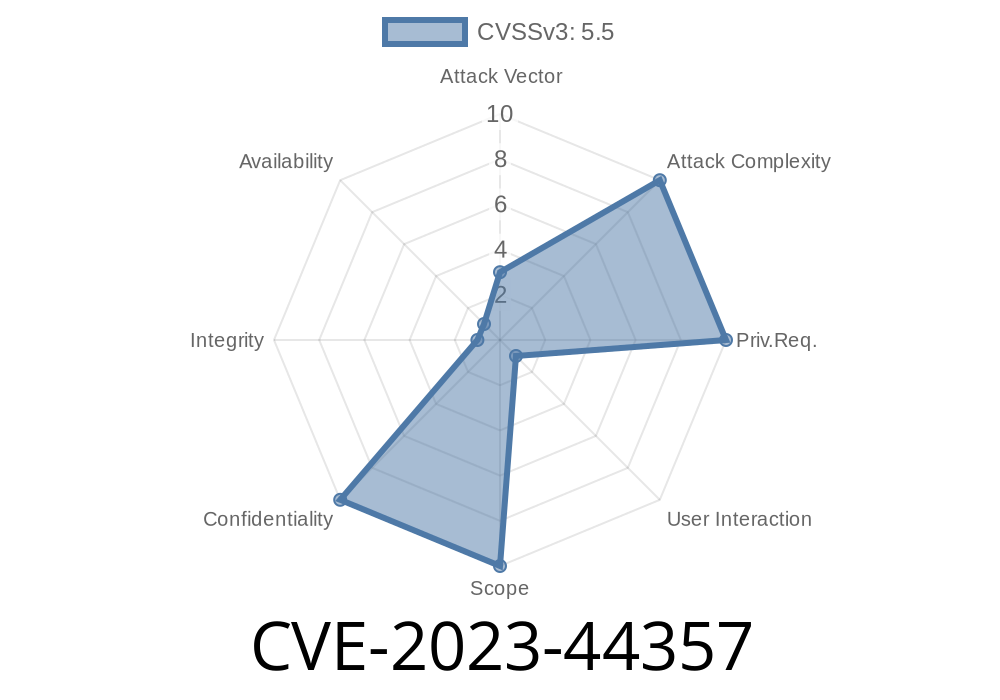Adobe Acrobat Reader is one of the most popular PDF readers in the world. But like any widely used software, it’s also a major target for attackers. In September 2023, a critical vulnerability called CVE-2023-44357 was announced, threatening users of Adobe Acrobat Reader version 23.006.20360 and earlier, as well as version 20.005.30524 and earlier. In this article, we’ll break down what this vulnerability is, how it can be exploited, and how you can stay protected.
What Is CVE-2023-44357?
Simply put, CVE-2023-44357 is an out-of-bounds read vulnerability. This means that when Adobe Acrobat Reader processes a specially crafted PDF file, it can accidentally access parts of the computer's memory that it shouldn't. In the right hands, this can lead to disclosure of sensitive data, such as passwords, cryptographic keys, or even system details that make further attacks easier.
Why Is This Dangerous?
You might wonder, "It’s just reading memory, right? How bad can it be?" The problem is that this can completely bypass important operating system protections like *Address Space Layout Randomization (ASLR)*. ASLR is a safeguard that randomly arranges addresses used by system and application processes in memory, making deep exploitation much harder for attackers.
If an attacker can use CVE-2023-44357 to read arbitrary memory, they can possibly find the location of important libraries and target them, defeating ASLR and setting up for more severe attacks.
A Technical Dive — How Does CVE-2023-44357 Work?
While private Adobe source code is unavailable, vulnerability researchers have analyzed public crash dumps and PoC (Proof-of-Concept) files. The bug itself lies in the way Adobe Reader parses certain PDF object streams or images. If an attacker creates a PDF with malformed or oversized objects, the PDF parser can read past the end of a buffer, exposing data that should be private.
Here’s a simplified, hypothetical version of what might happen in code
void parsePDFObject(char *data, size_t size) {
char buffer[128];
// BUG: No bounds checking!
memcpy(buffer, data, size);
// Later code treats buffer as safe, but it may now contain more data than intended
processObject(buffer);
}
An attacker with control over "*data*" and "*size*" can craft "*size*" so that it’s larger than 128 bytes. This would overwrite adjacent memory, and any “leak” will expose this extra memory to the attacker.
To exploit CVE-2023-44357, attackers usually follow these steps
1. Create a Malicious PDF: Use free tools like PoC files from exploit-db or custom scripts to build a PDF with malformed objects.
2. Weaponize the Memory Leak: Position the leak to expose specific pieces of memory — for instance, ASLR base addresses, sensitive variables, or documents open in the editor.
3. Deliver the PDF: Email or otherwise send the booby-trapped file to the target, enticing them to open it.
4. Trigger & Exfiltrate: Once opened, the exploit leaks memory, which can be transmitted back to the attacker or used in a follow-up attack.
Proof-of-concept Python snippet: (for educational purposes only!)
from PyPDF2 import PdfWriter
pdf_writer = PdfWriter()
pdf_writer.add_blank_page(width=72, height=72)
pdf_writer.warning("Attempting crafted malformed object...")
# Oversized field designed to trigger out-of-bounds read
pdf_writer.add_metadata({'/Title': 'A' * 100})
with open('exploit.pdf', 'wb') as f:
pdf_writer.write(f)
*Note: This code does not exploit CVE-2023-44357 directly, but hints at how attackers may craft abnormal PDF metadata as part of an exploit chain.*
Links to Original References
- NIST National Vulnerability Database | CVE-2023-44357
- Adobe Security Bulletin (APSB23-41)
- ZDI Advisory
- Exploit-DB Page (Search)
Acrobat 202: update to 20.005.30537 or later
Always download updates directly from the official Adobe website.
NEVER open PDF files from unknown sources. If you receive a suspicious or unexpected PDF, especially from email, don’t open it.
Conclusion
CVE-2023-44357 reminds us how even routine activities, like reading PDFs, can expose us to big risks. By understanding the basics of memory vulnerabilities and staying updated, you can keep your devices and data much safer. Attackers are constantly finding new ways to turn simple bugs into powerful exploits, so software updates and a careful eye on incoming files are your best defense.
Timeline
Published on: 11/16/2023 10:15:13 UTC
Last modified on: 11/22/2023 17:04:47 UTC
